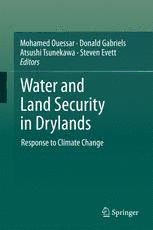
Water and Land Security in Drylands: Response to Climate Change PDF
Preview Water and Land Security in Drylands: Response to Climate Change
Mohamed Ouessar · Donald Gabriels Atsushi Tsunekawa · Steven Evett Editors Water and Land Security in Drylands Response to Climate Change Water and Land Security in Drylands Mohamed Ouessar Donald Gabriels (cid:129) Atsushi Tsunekawa Steven Evett (cid:129) Editors Water and Land Security in Drylands Response to Climate Change 123 Editors MohamedOuessar Atsushi Tsunekawa Institut des RégionsArides AridLand Research Center Medenine Tottori University Tunisia Tottori Japan Donald Gabriels Faculty of Bioscience Engineering StevenEvett GhentUniversity USDA-ARS Ghent Bushland, TX Belgium USA ISBN978-3-319-54020-7 ISBN978-3-319-54021-4 (eBook) DOI 10.1007/978-3-319-54021-4 LibraryofCongressControlNumber:2017932625 ©SpringerInternationalPublishingAG2017 Thisworkissubjecttocopyright.AllrightsarereservedbythePublisher,whetherthewholeorpart of the material is concerned, specifically the rights of translation, reprinting, reuse of illustrations, recitation, broadcasting, reproduction on microfilms or in any other physical way, and transmission orinformationstorageandretrieval,electronicadaptation,computersoftware,orbysimilarordissimilar methodologynowknownorhereafterdeveloped. The use of general descriptive names, registered names, trademarks, service marks, etc. in this publicationdoesnotimply,evenintheabsenceofaspecificstatement,thatsuchnamesareexemptfrom therelevantprotectivelawsandregulationsandthereforefreeforgeneraluse. The publisher, the authors and the editors are safe to assume that the advice and information in this book are believed to be true and accurate at the date of publication. Neither the publisher nor the authorsortheeditorsgiveawarranty,expressorimplied,withrespecttothematerialcontainedhereinor for any errors or omissions that may have been made. The publisher remains neutral with regard to jurisdictionalclaimsinpublishedmapsandinstitutionalaffiliations. Printedonacid-freepaper ThisSpringerimprintispublishedbySpringerNature TheregisteredcompanyisSpringerInternationalPublishingAG Theregisteredcompanyaddressis:Gewerbestrasse11,6330Cham,Switzerland Short Biography of Dr. Houcine Taâmallah BorninSidi Bouzid (centralTunisia) in1960, Dr. Houcine Taâmallah completed his undergraduate and M.Sc. studies at the National Agronomic Institute of Tunisia (Institut National Agronomique de Tunisie) (INAT) in 1984 and 1987, respectively. He received a Ph.D. in Agricultural Sciences (Soil and water management) from the Faculty of Applied Bio-engineering Sciences of the University of Ghent (Belgium) in 2007. After working for a private company (1987–1988), he joined the Arid Zone Research Institute (Institut des Régions Arides) (IRA) (Médenine, Tunisia) in 1988 as a researcher. Since his appointment at IRA, he contributed actively, as coordinator or team member, to the realization of numerous joint research projects funded by national and international agencies (WB, ABOS, EU, CSFD, UNU, UNESCO, etc.). His research programs focused mainly on land degradation, soil physics and fertility, climate change impacts and adaptation, combating desertification, and drylands management. He contributed also to training and capacity building through supervision of trainees and students of all levels from national and international centers and organizations and universities, part time teaching at the universities on drylands and natural resources management related issues, and organization of specialized local and international training sessions. He was solicited to provide expertise for studies and/or projects conducted by numerous national (Ministries of Agriculture, Environment, Planning) and international organizations (FAO, GTZ, OSS, UNU, etc.) in addition to assisting local development agencies (agriculture, environment, development). He published several scientific papers in national and international journals in addition to his contribution to the edition of books and book chapters. He moved in 2012 to work as a university professor in soil sciences at the National School of Rural Engineers (ESIER) in Medjez El Bab. He passed away on May 16, 2013. Foreword Drylands are increasingly considered as regions of major concern for the interna- tional community because they are subject to natural resource degradation and depletion,particularlyintermsofsoilandwater.Climatechangewouldexacerbate pressureonthose resources.The inhabitantsof dryland regions areforced tomake various adaptations. Therefore, the research community has to play a key role in assisting local societies and development agencies by bringing science to play in guiding field actions. Itisinthisspiritthattheinternationalconferenceon‘IntegratedLandandWater Resources Management in the Dry Areas Under Climate Change’ (ILDAC2015) wasorganizedinDjerbaIsland,Tunisia,duringMay11–14,2015.Itwasorganized in memory of Dr. Houcine Taamallah, senior researcher in soil sciences and combating desertification, who worked for IRA from 1988 to 2012. It brought around 200 participants of 18 nationalities from Africa, Europe, the USA, and the Middle East. The objectives were as follows: (cid:129) Updates on climate change and projections (cid:129) Present recent developments in land and water resources management in the drylands (cid:129) Provide a forum for debate and exchange among all stakeholders working for drylands development (cid:129) Learn from local experiences incombating land degradation and desertification In order to share the outcomes, this proceedings book contains a selection of 27 papers out of the 50 oral presentations and 190 posters presented in this conference. Wewishtothankalltheconference partnersthatassistedintheorganizationof this conference. Special thanks are due to donor agencies, ICARDA, the EU, and the Government of Tunisia, who generously contributed in ensuring the ix x Foreword participation of the key people involved in research for development of drylands. A special mention must go to the editors and contributing authors as well as Springer for agreeing to publish these proceedings. August 2016 Prof. Houcine Khatteli Director General Institut des Régions Arides (IRA) Medenine, Tunisia Em. Prof. Dr. ir. Donald Gabriels UNESCO Chair for Eremology Ghent University Ghent, Belgium ILDAC2015 Proceedings Ouessar et al. (editors) List of Reviewers Dr. Lamine Babasy (OSS, Tunisia) Dr. Hédia Chakroun (ENIT, Tunisia) Dr. Gabriel DEL BARRIO (CSIC-EEZA, Spain) Dr. Boubakr Dhehibi (ICARDA, Jordan) Dr. Gunay Erpul (Univ Ankara, Turkey) Dr. Steven Evett (ARS-USDA, USA) Prof. Donald GABRIELS (Univ. Ghent, Belgium) Prof. Giorgio GHIGLIERI (Univ. Cagliari, Italy) Dr. Caroline King (IIED, UK) Dr. Mohamed MOUSSA (IRA, Tunisia) Dr. Kamel Nagaz (IRA, Tunisia) Dr. Zuhair NASR (INRGREF, Tunis, Tunisia) Dr. Mohamed Ouessar (IRA, Tunisia) Prof. Mongi Sghaier (IRA, Tunisia) Prof. Albert SOLE (CSIC, Spain) Prof. Atsushi TSUKENAWA (Tottori Univ., Japan) Dr. Mounira ZAMMOURI (FST, Tunisia) xi
